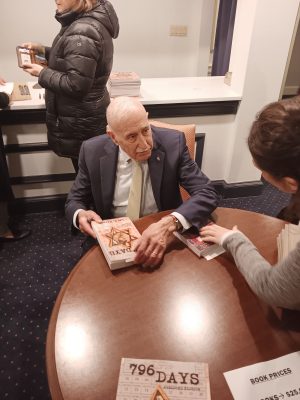Survivor Tells His Story of Surviving the Nazis at Remembrance Program
News Based on facts, either observed and verified directly by the reporter, or reported and verified from knowledgeable sources.

In extraordinarily difficult times, there’s no telling what people will do to survive.
For Leo Ullman, who was born in the Netherlands in 1939 just before the outbreak of World War II in Europe, it was his parents’ decision to give their only child at the time to a non-Jewish family in Amsterdam so he would have the best chance evading the Nazis.
In Nazi-occupied Holland, Jews were stripped of most of their rights, and Ullman’s father received a notice to report to the train station because he was to be relocated to a work camp.
“When he went to the station, he saw that people were being pushed into cattle cars, and he thought this wasn’t going to go very well, and because my mother’s sister and her family had been taken, he made the decision, or they made the decision, my parents did, that they had to go into hiding as the only means of saving my life and their own lives,” Ullman said.
Ullman was the featured speaker at a special program last Wednesday evening at the Chappaqua Performing Arts Center in recognition of International Holocaust Remembrance Day. It was presented by the Horace Greeley High School’s E.N.O.U.G.H. Club and the New Castle Holocaust and Human Rights Committee.
Starting just before turning three years old, Ullman spent close to two-and-a-half years in hiding with his war family, a retired police officer and his wife and their daughter.
“They didn’t know who I was. They knew I was a Jewish kid,” Ullman told the audience of close to 400 people. “They didn’t know my parents; they didn’t know where I came from and they decided that they would take me in.”
“They took the ultimate risk,” he added. “If anybody knew they were hiding a Jewish kid, we have would been taken, or they would be killed immediately.”
Meanwhile, his parents spent the same amount of time in hiding in an attic above an Amsterdam store. Ullman’s father first needed to earn some extra to pay for the space. They survived those two-and-a-half years with no heat and no light, staying in a room 24 hours a day with very little food, Ullman said.
Periodically, the Germans would conduct raids where they would search homes and apartments for people hiding Jews.
“We were a little bit lucky that my war father had a female friend who was German and had a bar in Amsterdam, and they heard when there would be raids where the Germans would block off both ends of the street and go house by house looking for hidden Jews,” Ullman said.
In early May 1945, Holland was liberated, a couple of days before Germany surrendered. Members of the local resistance notified Ullman’s parents where their son had been taken in.
“My parents came to pick me up; I didn’t recognize them,” he said. “It had been two-and-a-half years. I was less than three, and these people just looked awful, they were emaciated, they weighed 60, 70 pounds.”
“That was tough for everybody,” Ullman continued. “That was tough for my war parents because I had become their son. It was tough for my parents because I didn’t know them and it was tough for me in a way because suddenly these people were my parents (again) and I had to go with them.”
UIlman’s father returned to work for one of the largest department stores in Amsterdam. Two years later, the family would immigrate to the United States joining his maternal grandmother who had settled in Port Washington on Long Island in 1946. By then Ullman had a younger brother.
Although he spoke no English when coming to the U.S., Ullman, now 84, would go on to study at Harvard and Columbia, earning business and law degrees. He served in the U.S. Marine Corps, worked for a corporate law firm in New York, and invested in real estate and has managed properties.
He has been married for 64 years to his wife, Kay, and they continue to live in Long Island. The couple has four children and nine grandchildren.
While his war father died in 1951, Ullman stayed in regular contact with his war mother, who lived into the 1980s, and sister, and used his influence to have them admitted to Yad Vashem, where Israel recognizes non-Jews, who risked their lives to help save Jews during the Holocaust.
“I always asked (my war mother) ‘Why would you do this?’” Ullman recalled. “She said ‘Because it’s the right thing to do.’”
Ullman said that education is the key to overcoming hate and the scourge of antisemitism in the U.S. and internationally.
“We have to teach younger people what’s right and what’s wrong and to tell the story of the Holocaust,” he said.

Martin has more than 30 years experience covering local news in Westchester and Putnam counties, including a frequent focus on zoning and planning issues. He has been editor-in-chief of The Examiner since its inception in 2007. Read more from Martin’s editor-author bio here. Read Martin’s archived work here: https://www.theexaminernews.com/author/martin-wilbur2007/
